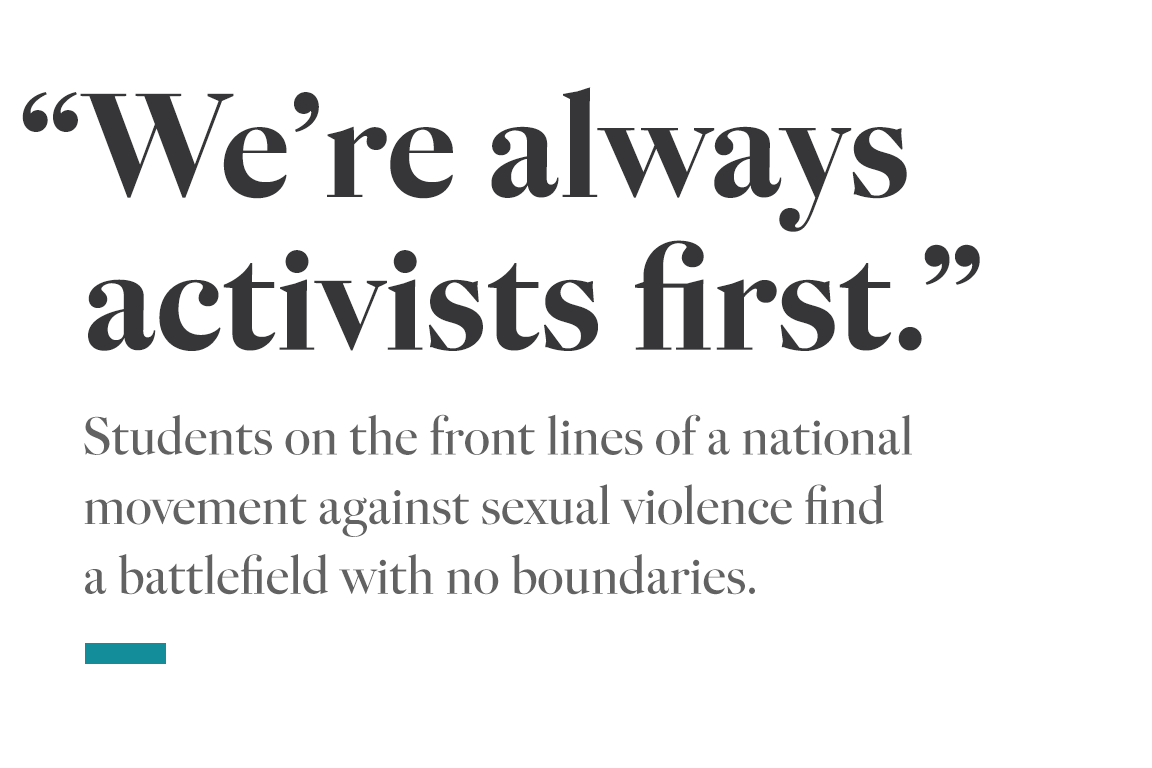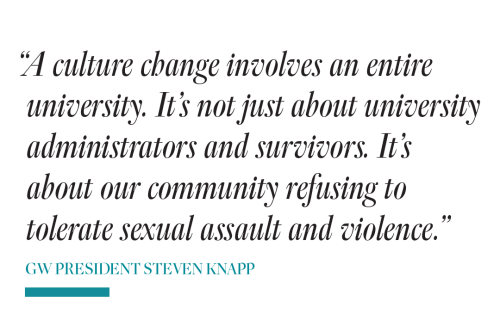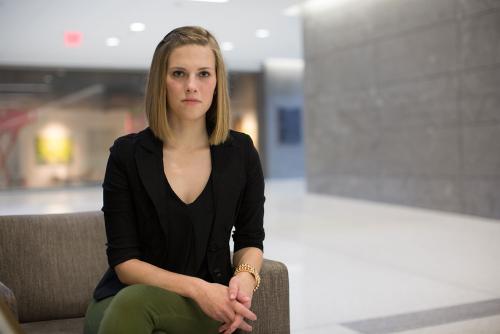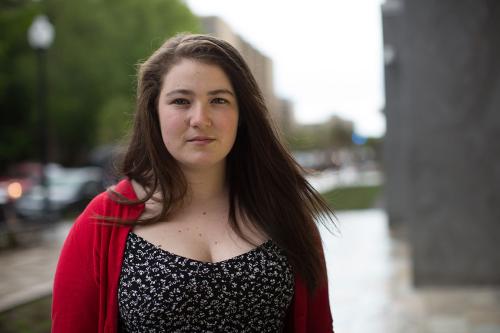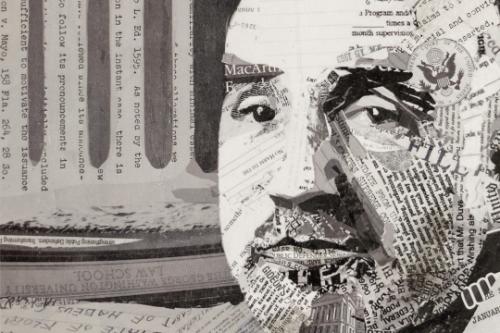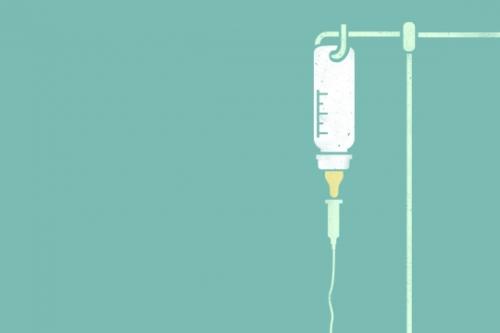“We’re always activists first”
By Ruth Steinhardt
Everywhere she goes, Kirsten Dimovitz is the recipient of difficult secrets.
“At parties, or grocery shopping or in line for food, or sometimes I’m on my way to class and I get a text from somebody I only kind of know, and they want to talk,” she says.
The stories she hears can be emotional and confused. Some people want an explanation for a bad sexual experience. Others want a word for what happened to them. Most just want someone to listen.
Not all of the people who approach her are survivors of sexual violence or friends of survivors. Some want to talk abstractly about policy. Some want to schedule training for their student organizations. As co-president of the GW organization Students Against Sexual Assault, or SASA, Ms. Dimovitz is one of the most visible faces in Foggy Bottom for an issue that has hit a flashpoint across the nation.
She and other activists must juggle multiple public and private identities, serving as confidants, coaches, diplomats and agitators. And, when possible, as ordinary 20- and 21-year-old students.
“But we’re always activists first,” Ms. Dimovitz says. “When we want to be, and when we don’t.”
Over the rattle of cappuccino machines and the calls of baristas at a crowded Starbucks on H Street, Ms. Dimovitz remembers her spirited younger self with a self-deprecating grimace. She was a defender of the underdog at her small school, she says, always trying to change her classmates’ conservative views about issues like gay marriage and feminism.
“My dad and I have this motto: When you talk to someone, you plant a seed,” she says.
Broadscale issue diplomacy “was basically my daily routine in school.” Then a close friend suffered an assault.
The incident turned her social circle upside down, and the issue of sexual violence became her consuming focus: advocating for survivors and fostering a culture where it would not happen to anyone else.
When she arrived at GW in 2013, she made a point of joining SASA—which at the time, she says, was “more support group-y.”
“We spent most of our meetings just talking,” she remembers. “It was very supportive, and that was great.”
But SASA members no longer have much time to talk. Ms. Dimovitz says that in addition to setting up near-constant awareness trainings for fraternities, sororities and other student organizations, the group’s focus has shifted in reaction to what is shaping up to be a historic moment or, at the least, a tipping point.
Public and media engagement on the issue of campus sexual assault has steadily crescendoed over the past year, demanding introspection and change in the face of troubling statistics. A 2007 study conducted by the Justice Department’s National Institute of Justice estimated that 1 in 5 women is sexually assaulted during her college years, and that just 12 percent of those assaults are reported. (Study findings vary and have limitations; regardless, many experts believe sexual assaults are underreported.)
The federal government, in response, has made the issue a priority. More than 100 universities are under investigation by the Department of Education for alleged violations related to the handling of sexual violence under the law known as Title IX, which guarantees equity between the sexes at federally funded educational institutions. The White House launched a task force on the issue last January. By the summer, legislation had been introduced in Congress to create campus resources for survivors and increase administrative transparency. And in September, the White House launched the “It’s On Us” awareness campaign, aimed at sparking community-wide engagement.
It’s On Us
In January 2015, the George Washington University joined the “It’s On Us” White House campaign.
GW President Steven Knapp attended the White House event, along with the president of the Student Association and other university officials. “A culture change involves an entire university,” Dr. Knapp said afterward. “It’s not just about university administrators and survivors. It’s about our community refusing to tolerate sexual assault and violence.”
Students and administrators had been bringing the issue to the front burner at the university, including
taking a hard look at the extent and nature of the problem, which is being used to chart a path forward. A survey of more than 700 students conducted in April 2014 found, in part, that 22 percent of undergraduate students reported experiencing what they would consider to be sexual harassment, sexual violence, dating/domestic violence or stalking while enrolled at the university. Among graduate student respondents, the figure was 6 percent.
The university also has been consolidating and strengthening its Office of Diversity and Inclusion, under which most issues of sexual violence prevention will eventually fall.
Terri Harris Reed, the vice provost at the helm of that office, brought on board Rory Muhammad in November as Title IX coordinator, overseeing compliance with the gender-equity law across the university, from issues surrounding harrassment and sexual assault to discrimination in sports, education and the workplace. The office also added Carrie Ross, assistant director for sexual assault prevention and response, in March of this year.
Both serve on a new Presidential Committee on Sexual Assault Prevention and Response, a group of administrators, staff, faculty and students who are designing and implementing a revised slate of educational programs on sexual violence.
“As important as it is to have a response strategy in place, it’s just as important to have our prevention strategies in place,” Mr. Muhammad said during an interview in February. “We want to provide the community with skills and tools that prevent Title IX violations from happening. That means potential assaulters, potential victims, potential bystanders—everybody.”
The committee is focused on adding resources but also boosting awareness of the resources that exist:
In the survey from last year, about 80 percent of students said they did not know how to contact GW’s Title IX office or the Sexual Assault Response Consultative Team, staff members trained to assist survivors of sexual assault. New efforts to close that gap include Title IX information sessions for incoming students and their parents during this summer’s Colonial Inauguration orientation events. There will be mandatory in-person and online sexual assault prevention training in the fall for incoming undergraduates, and mandatory online training for graduate students. A dozen student residential advisers also are being recruited for special training on sexual assault issues, and to serve as points of contact and support.
As the issue swelled on campus and across the nation, SASA saw a pivot point and began staging larger events and positioning itself as a representative student voice on the issue.
“Moments arise in history and you either capitalize on them or you don’t,” Ms. Dimovitz says.
Many student groups on campus deal with issues surrounding sexual assault, including Allied in Pride, the Feminist Student Union and various affinity groups. But SASA’s position is unique: It is the only sizable organization dedicated solely to combating sexual violence, and it has evolved within student memory from essentially a discussion group to a lobbying force.
In the fall, the group brought to campus first lady Michelle Obama’s chief of staff, Tina Tchen, in coordination with a universitywide week of “It’s On Us”-related events. SASA followed up with a semester’s worth of advocacy, including work with the Student Association to lead a groundswell of student support for mandatory sexual assault prevention programming ahead of the university’s announcement. The issue appeared as a referendum on student election ballots this spring, and was supported by 92 percent of voters.
SASA’s current leaders also serve on the university’s Presidential Committee on Sexual Assault Prevention and Response, along with Mr. Muhammad, Ms. Ross, and others.
“Every voice involved wants this campus to be safe, wants this campus to be responsive when things don’t go well and wants us to do as much as we can to promote health and safety, rather than only reacting when that’s not in place,” Ms. Ross says. “Even people who disagree [do so] because they have a deep commitment to resolving this issue. That’s a good problem to have.”
On a bright Sunday in April, SASA Vice President Laura Zillman stands in University Yard squinting against the sun. She and about a half-dozen other volunteers are running outdoor events as part of Take Back the Night, an international event that raises awareness of sexual violence.
The focus of the afternoon is “Walk a Mile in Their Shoes,” in which male participants wobble around in high heels while learning about sexual violence statistics. A group from the Delta Tau Delta fraternity, looking dapper in suits from the chapter meeting they’ve just left, try on sets of pumps under the guidance of an older brother.
“Dude, your calves look great,” one calls.
The fraternity has been a regular participant in the event for years, Ms. Zillman says. “We love them.”
It’s particularly gratifying given how difficult it can be to voluntarily engage people on such a volatile
issue. The topic, not surprisingly, makes people uncomfortable.
“Most people are not victims and are not perpetrators, so they don’t feel it’s relevant to them,” says Sarah McMahon, associate director of Rutgers University’s Center on Violence Against Women and Children. “People often don’t want to talk about it.”
The issues are also complex, calling for self-examination and openness to change.
“It’s really challenging sometimes … to understand the levels of victim-blaming that go on, and to think about not just why a victim experiences sexual violence but why a perpetrator perpetrated it,” Dr. McMahon says. “That’s shifting huge social norms and deeply ingrained beliefs, not just on college campuses but throughout our society.”
Two SASA activists lead the group off for a teetering circuit of the grassy quad, and in the lull their colleagues enjoy a moment of rest. One SASA member yawns. He was up until 6:30 a.m., he says, playing video games.
“Yeah, I don’t really feel bad for you,” Ms. Zillman says dryly.
She knows what it’s like to be tired. Opening a weekly planner with hours that are neatly blocked off with colorful bricks, she tells me that “everything in pink is for SASA.” There is no day without a pink block. Most of them have several.
Ms. Zillman’s day starts at 8, when she checks SASA’s email and Facebook accounts. Her own email is usually filled with SASA business, too. Mostly there are logistical concerns—requests for trainings and partnerships, event details, T-shirt sizes—but several times a week, she says, she receives an emotional message from someone in need of resources.
For her, those messages demand an instant response, even when she is in class or in the middle of another commitment.
“I understand that it takes a lot to send a message like that,” she says. “So I always want to respond quickly and acknowledge it and say, ‘I’m not ignoring you, thank you for trusting me with this, please give me a moment to respond substantively.’”
“No one told me that my friends would blame me,” a survivor says to the supportive snaps of a crowd gathered in Kogan Plaza. A woman in the audience, also a survivor, weeps almost soundlessly. “No one told me that I would blame myself. No one told me that it is much easier to hate yourself than to hate the person who violated you.”
The speaker’s voice trembles through the megaphone. “It was not my fault. I am not afraid. And I am telling the truth.”
A day after the men floundered in heels, the tone of Take Back the Night is raw and emotional. Ariella Neckritz, the co-president of SASA, was one of several people who shared stories and poetry at the event, herself a survivor of an abusive relationship.
“Demonstrations like this are about expressing pain and healing,” she tells me later. “Sharing your story is really powerful.”
The group had gathered not only to hear from survivors—the traditional centerpiece of Take Back the
Night—but also to rally in support of the mandatory prevention programming. The student referendum was nonbinding, and when the speakers were finished, students marched to Rice Hall to show their commitment to the issue.
“I’m so grateful every time someone shares their story with me,” Ms. Neckritz says a few days after the event. “The fact that people have that level of trust with us is so beautiful and humbling. But I think it is hard to deal with as human beings—constantly hearing these stories.”
She struggles with reliving her own pain during disclosures.
Even commonplace training sessions can wear on them, Ms. Dimovitz says. During small-group workshops, SASA peer educators sit with a few dozen classmates for frank discussions on sex, healthy relationships, what constitutes abuse and resources that are available. Sometimes these conversations involve dismantling long-held misperceptions about perpetrators and victims without alienating people who are trying to understand.
“You have to get past the destructive things they were taught,” Ms. Dimovitz says, “and meanwhile you’re also battling your own demons and your own guilt trip, and then it’s three hours later and you’re emotionally drained. And you’re like, ‘I’ve gotten through to one person!’ One person, and that’s great, but you’re exhausted.”
All three women agree that, anecdotally, most members of SASA are either survivors or have close friends who are. That makes it difficult to step back.
Carrie Ross, the assistant director for sexual assault prevention and response, founded a similar student group at her own alma mater. She says she has “a lot of respect and empathic memory” for student activists.
“I think that one of the hardest things about being a student activist is the feeling that you absolutely cannot say no,” she says. “There are always people in need, and you feel such a responsibility to your community.”
That feeling of endless obligation can mean that even victories often don’t feel quite like victories. Dr. Knapp met with the leaders of SASA just before the announcement this spring about instituting student training on sexual assault, affirming the university’s stance alongside the student referendum and advocacy work. An hour later, the SASA activists already felt uncertain. Would the training be enough? Would students cooperate? What input would they have?
“We’re always looking to the next thing,” Ms. Dimovitz says. “Sometimes I feel like we don’t let ourselves be happy.”
But to be “looking to the next thing,” of course, is to acknowledge progress. And even if the job never feels done, there is healing for the people they reach and for themselves.
Like Ms. Zillman, Ms. Neckritz says that activism is a “coping mechanism” for her—a way of “building peace.”
“The more I do this work, the more I find peace within myself,” she says. Part of that is because the work also provides a community. “You can share your experiences in a safe space, surrounded by people who can also say, ‘This happened to me.’ That helped me feel more comfortable in owning what happened to me and feeling OK about sharing it.”
Two of the three SASA leaders also utilize counseling sessions offered by Mental Health Services at the Colonial Health Center. That kind of personal care is an important part of the conversation that the university wants to have with student activists, Carrie Ross says.
“As we [the Title IX office and student activists] have more history together and develop that trust that only comes with working together, I want to integrate self-care into what we talk about,” she says. “Because it is really essential. There has to be some of your time that is not for sale.”
It’s an ongoing education for the student advocates and for GW administrators, as it is for universities nationwide and the media and the public at large. Confronting and preventing sexual assault will mean a constellation of changes to thoughts and actions on individual and societal levels. But if the first step is to peel back the fear that obscures the problem, to push it up into public consciousness, then it seems that the needle is moving.
After their meeting with Dr. Knapp, the SASA trio sits in the tempietto in Kogan Plaza. They’re dressed
professionally, but the April sun is out and before long Kirsten Dimovitz has kicked off her shoes to enjoy it. Passersby stop to congratulate them.
“People more and more want to be involved in and give to this work,” Ms. Neckritz says. “They’re liking the SASA Facebook page, they’re following what we’re doing … On campus, people are feeling much more comfortable acknowledging the subject.”
Asked whether this stint in advocacy will stay with them past college, Ms. Neckritz says she intends to remain an activist, and Ms. Zillman agrees: “I’ll always be doing this work,” she says, shrugging matter of factly.
Ms. Dimovitz hesitates. She’s a science and technology enthusiast, interning this summer at a biotech firm in Silicon Valley. She’d like to work at Google.
“But it still ties back into sexual assault awareness, ways I could contribute to that,” she says. She ticks off the possibilities: virtual reality as a training mechanism, coding for sexual assault prevention apps. Then, apparently feeling she’s gotten carried away, she breaks off.
“I could talk about tech forever,” she says with an embarrassed smile. “But I’m always talking about this.”
Where to Turn
University and nationwide resources are available to offer support and further information.
At GW
- Sexual Assault Response Consultative (SARC) Team Hotline | (202) 994-7222 | Non-emergency email: sarcteam
 gwu [dot] edu (subject: Sexual%20Assault%20Response%20Consultative%20%28SARC%29%20Team%20Hotline) (sarcteam[at]gwu[dot]edu). SARC team members are professionals trained to assist survivors of assault. Team members do not act as counselors but can provide information and resources to make informed decisions.
gwu [dot] edu (subject: Sexual%20Assault%20Response%20Consultative%20%28SARC%29%20Team%20Hotline) (sarcteam[at]gwu[dot]edu). SARC team members are professionals trained to assist survivors of assault. Team members do not act as counselors but can provide information and resources to make informed decisions. - Haven, a hub for on- and off-campus resources regarding harassment and abuse, intended for faculty, staff, students and visitors to the university.
- GW Title IX Office | (202) 994-2657
- GW Students Against Sexual Assault
- GW Police Department | Emergency: (202) 994-6111 | Non-emergency: (202) 994-6110
Nationwide
- National Sexual Assault Hotline | 1 (800) 656-HOPE (4673). Maintained by the Rape, Abuse & Incest National Network, this 24-hour hotline offers free, confidential counseling and support.
- National Dating Abuse Hotline | 1 (866) 331-9474, or text “LOVEIS” to 22522
- Deaf Abused Women’s Network (DAWN) | Videophone: (202) 559-5366
- Gay, Lesbian, Bisexual and Transgender National Help Center | 1 (888) 843-4564
Other Summer Features
Five Years Later in Haiti
Half a decade after a catastrophic earthquake, a Pulizter Prize winner finds that life in the beleaguered nation goes on, as it always has.
Promise Keeper
MacArthur Fellow Jonathan Rapping is helping the government fulfill its duty to stand up for the indigent accused with his program, Gideon's Promise.
Reuniting Babies and Their Bottles
Feeding tubes and surgeries offer an imperfect fix for infants with disorders that leave them unable to eat. The problem is in the brain, and that's where GW researchers are looking for a cure.


